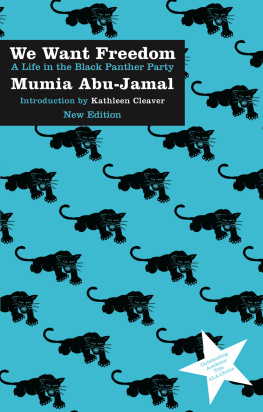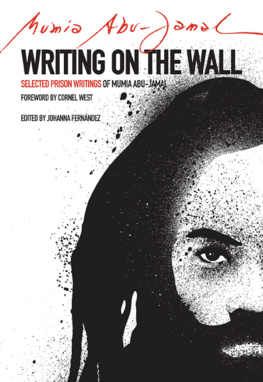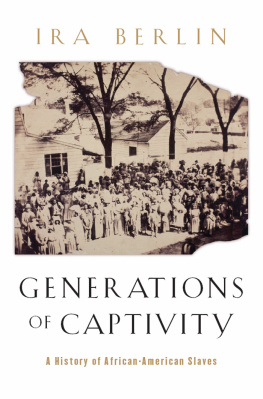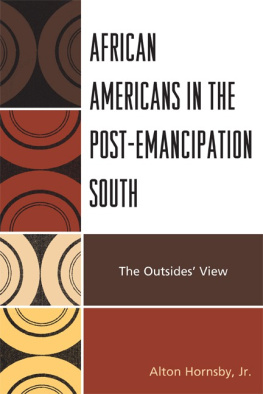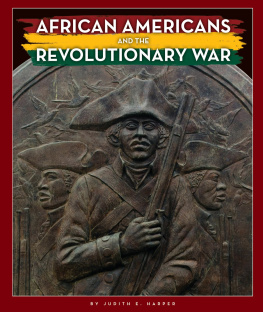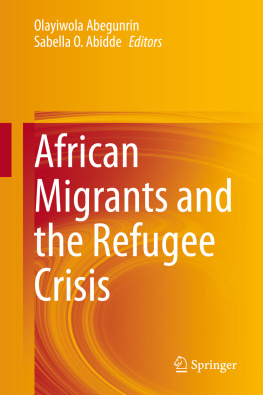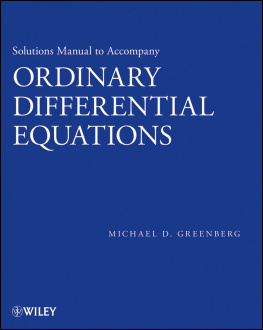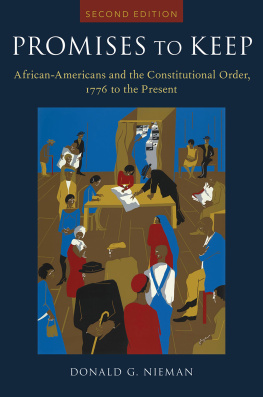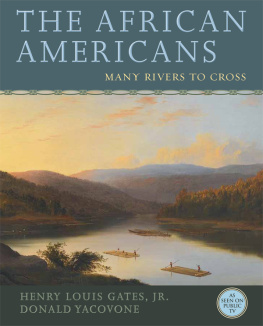ABOUT THE EDITORS
One of Americas most influential interpreters of the African-American experience is Manning Marable . Marable is currently the M. Moran Weston and Black Alumni Professor of African-American Studies, professor of public affairs, history and political science, and director of the Center for Contemporary Black History (CCBH) at Columbia University in New York City. For ten years, he was founding director of Columbias Institute for Research in African-American Studies (1993 to 2003). A prolific writer, since 1975 Marable has produced 15 books, 13 edited volumes, and over 400 articles in academic journals, anthologies, encyclopedias, and related publications. Marables major works include How Capitalism Underdeveloped Black America (1983); Beyond Black and White (1995); The Great Wells of Democracy (2002); and Living Black History (2006). Since 1999, he has also been founding editor of the quarterly academic publication Souls: A Critical Journal of Black Politics, Culture and Society .
Leith Mullings is Distinguished Professor of Anthropology at the Graduate Center, City University of New York. Her books include: Therapy, Ideology and Social Change: Mental Healing in Urban Ghana (1984); Cities of the United States (editor, 1987); On Our Own Terms: Race, Class and Gender in the Lives of African American Women (1997); Stress and Resilience: The Social Context of Reproduction in Central Harlem (2001, with Alaka Wali); Freedom: A Photohistory of the African American Struggle (2002, with Manning Marable); Gender, Race, Class and Health: An Intersectional Approach (2005, coedited with Amy Schulz). In addition, she has written numerous articles and book chapters on stratification, ethnicity, race, gender, health, globalization, participatory research, public policy, and social movements. She is currently working on an edited volume, Rethinking Global Justice: Social Movements in the African Diaspora , forthcoming in 2009. Mullings has served on the executive boards of the American Ethnological Society and the American Anthropological Association. Her awards include the Chair in American Civilization at the cole des Hautes tudes en Sciences Sociales in Paris and the Prize for Distinguished Achievement in the Critical Study of North America from the Society for the Anthropology of North America.
PERMISSIONS
SECTION ONE: FOUNDATIONS, 17681861
1. Excerpt from Complete Writings by Phillis Wheatley , intro. by Vincent Carretta, ed. by Vincent Carretta. Copyright 2001 by Vincent Carretta. Used by permission of Viking Penguin, a division of Penguin Group (USA) Inc.
2. Excerpt from Olaudah Equiano, The Interesting Narrative of the Life of Olaudah Equiano, or Gustav Vasa, the African in 2 volumes (New York, 1789 and 1791).
3. Prince Hall, Thus Doth Ethiopia Stretch Forth Her Hand from Slavery, to Freedom and Equality. Excerpt of speech delivered at black Masonic lodge, Menotomy, Massachusetts, June 24, 1797. Originally published in William C. Nell, The Colored Patriots of the American Revolution (Boston: R. F. Wallcut, 1855), pp. 6164; also in Philip S. Foner, ed., The Voice of Black America (New York: Simon and Schuster, 1972), pp. 1315.
4. The Founding of the African Methodist Episcopal Church. Excerpt from Richard Allen, The Life, Experience and Gospel Labors of the Rt. Rev. Richard Allen (Philadelphia: Lee & Yocum, 1888), pp. 1117, 2324.
5. David Walkers Appeal, 18291830 . Excerpt from David Walker, David Walkers Appeal in Four Articles; Together with a Preamble, to the Coloured Citizens of the World, but in Particular and Very Expressly, to those of the United States of America (Boston: Revised and published by David Walker, 3rd ed., 1830).
6. The Statement of Nat Turner, 1831 . Autobiographical Statement of Nat Turner, published in Thomas R. Gray, ed., The Confessions of Nat Turner, the leader of the late insurrection in Southampton, Va . (Baltimore: 1831).
7. Slaves Are Prohibited to Read and Write by Law, 1831 . Act Passed by the General Assembly of the State of North Carolina at the Session of 18301831 (Raleigh: 1831).
8. Mrs. Stewarts Farewell Address to Her Friends in the City of Boston, Delivered September 21, 1833, published as Productions of Mrs. Maria W. Stewart (Boston: William Lloyd Garrison and Knapp, 1832).
9. A Slave Denied the Rights to Marry, 1834 . Letter from Milo Thompson (slave) to Louisa Bethley, October 15, 1834, in Dwight L. Diamond, ed., Letters of James G. Birney, 18311857 , Vol. I (New York: Appleton-Century, 1938), p. 144.
10. The Selling of Slaves, 1835 . Advertisement, Hewlett and Bright Sale of Valuable Slaves, New Orleans, May 13, 1835. Copy at the New-York Historical Society.
11. Solomon Northrup Describes a New Orleans Slave Auction, 1841 . Solomon Northrup, Twelve Years a Slave (Auburn, N.Y.: 1853), p. 78.
12. Cinque and the Amistad Revolt, 1841 . Excerpts from the United States Appellants v. the Libellants and Claimants of the Schooner Amistad, Supreme Court of the United States, 15 Pet. (40 U.S.) 581, 587 (1841).
13. Let Your Motto Be Resistance! Henry Highland Garnet, 1843 . An Address to the Slaves of the United States of America, 1843, reprinted in Garnet, A Memorial Discourse by Rev. Henry Highland Garnet (Philadelphia: Joseph M. Wilson, 1865), pp. 4451.
14. Slavery as It Is, William Wells Brown, 1847 . A Lecture Delivered before the Female Anti-Slavery Society of Salem at Lyceum Hall, November 4, 1847, by William Wells Brown, A Fugitive Slave, reported by Henry M. Parkhurst, Boston, 1847.
15. Ant I a Woman? Sojourner Truth, 1851 . (1) Excerpt from The Anti-Slavery Bugle , June 21, 1851; and (2) Reported in Elizabeth Cady Stanton, Susan B. Anthony, and M. J. Gage, History of Women Suffrage , Vol. I (Rochester, N.Y.: 1887).
16. Mary Ann Shadd Cary, excerpts from A Plea for Emigration, or Notes of Canada West , ed. by Richard Almonte. Toronto: The Mercury Press, 1998, pp. 4344 and 8889. Reprinted by permission.
17. A Black Nationalist Manifesto, Martin R. Delany, 1852 . Excerpt from The Condition, Elevation, Emigration, and Destiny of the Colored People of the United States, Politically Considered (Philadelphia: Privately Printed, 1852).
18. What to the Slave Is the Fourth of July? Frederick Douglass, 1852 . From: Alice Moore Dunbar, ed., Masterpieces of Negro Eloquence (New York: Bookery Publishing, 1914), pp. 4247.
19. No Rights That a White Man Is Bound to Respect: The Dred Scott Case and Its Aftermath. From: (1) Dred Scott petitions for his freedom, July 1847, Missouri Court Records, St. Louis; (2) Roger B. Taney, excerpt from Obiter Dictum on Dred Scott v. Sandford, 1857; and (3) Excerpt from Frederick Douglass, A Most Scandalous and Devilish Perversion of the Constitution, speech denouncing the Dred Scott decision, May 1857.
20. Whenever the Colored Man Is Elevated, It Will Be by His Own Exertions, John S. Rock, 1858 . Speech from The Liberator , March 12, 1858.
21. The Spirituals: Go Down, Moses and Didnt My Lord Deliver Daniel. Traditional spirituals.
SECTION TWO: RECONSTRUCTION AND REACTION, 18611915
1. What the Black Man Wants, Frederick Douglass, 1865 . Excerpt from What the Black Man Wants, speech delivered in 1865.
2. Henry McNeal Turner, Black Christian Nationalist. Speech delivered on September 3, 1868, before the Georgia State Legislature.
3. Black Urban Workers during Reconstruction. (1) Excerpt, The National Colored Labor Convention, 1869, American Workman , Boston (December 25, 1869), p. 2; and (2) excerpt, article on African-American workers in Baltimore, New York Tribune (September 1, 1870).
4. Labor and Capital Are in Deadly Conflict, T. Thomas Fortune, 1886 . Speech delivered on April 20, 1886, Brooklyn Literary Union, printed in the New York Freeman , May 1, 1886.


